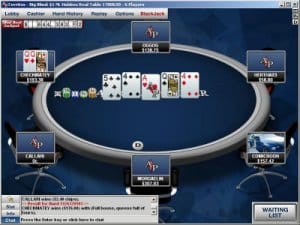U.S. Government in Possession of Absolute Poker Software

 Three more documents were filed on Friday in the ongoing Black Friday case. Whereas much of the case in recent months has centered on Full Tilt Poker and, to a lesser extent PokerStars, these particular documents focused on the largely ignored third leg of the wobbly stool, Absolute Poker.
Three more documents were filed on Friday in the ongoing Black Friday case. Whereas much of the case in recent months has centered on Full Tilt Poker and, to a lesser extent PokerStars, these particular documents focused on the largely ignored third leg of the wobbly stool, Absolute Poker.
Earlier this month, we posted an articlehere on PocketFives about how a Portuguese group that allegedly owns the assets of Absolute Poker, Avoine-Servico de Consultadoria e Marketing (Avoine), contested the seizure of said assets by the U.S. Department of Justice. Jason Cowley, the attorney representing the U.S. DOJ, rebutted Avoine’s claims, citing the shady chain of ownership of the poker room over the years as well as a previous statement by Avoine that it had no involvement with Absolute.
On Friday, Cowley filed a Reply Memorandum of Law to further support the Government’s order for settlement of the case and for the interlocutory sale of Absolute’s assets. Before we continue, it should be explained that an interlocutory sale is one made when the assets at hand are at risk of devaluation and is often allowed before a case is settled.
In the Memorandum, Cowley stated that the longer Absolute Poker’s assets sit around, the more they will deteriorate in value. Customer lists become less valuable as time goes by because customer data becomes out-of-date, more and more players stop playing poker, and the players lose touch with the Absolute brand. The software is also losing value because it has gone unused for more than a year and no updates have been made during that time. As such, an interlocutory sale is a valid action.
 Cowley also noted that Avoine argued the Government does not have ownership of Absolute Poker’s software and therefore should not be allowed to sell its assets. To the contrary, the Government showed that last week, it received the software from Quad Dimensions, Inc., the company that developed and maintained Absolute Poker’s software.
Cowley also noted that Avoine argued the Government does not have ownership of Absolute Poker’s software and therefore should not be allowed to sell its assets. To the contrary, the Government showed that last week, it received the software from Quad Dimensions, Inc., the company that developed and maintained Absolute Poker’s software.
As part of its evidence, the U.S. Government presented a letter from Young Jae Lee, CEO of Quad Dimensions. In it, Lee confirmed he gave the software, including the client’s source code, to the U.S. Government. He also signed away all claims to the software, agreed not to give any copies to anyone without the permission of the Government, and agreed to delete any copies he has if the Government asks him to do so.
What it all boils down to is that the U.S Government sees an interlocutory sale of Absolute Poker’s assets as completely justified, as it feels it needs to sell as quickly as possible in order to maximize its return and it has proper claim to those assets. No matter the argument that Avoine puts forth, the Government seems to have a counter.
The proceeds from an interlocutory sale would go toward settling the Black Friday lawsuit against Absolute Poker. The former popular online poker room is staring at upwards of $100 million in fines and settlement costs.